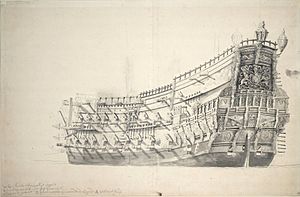English ship Constant Reformation (1619) facts for kids

English ship Constant Reformation (1619)
|
|
Quick facts for kids History |
|
|---|---|
| Name | Constant Reformation |
| Builder | Burrel, Deptford |
| Launched | 1619 |
| Fate | Ran aground and wrecked in 1651, near Terceira Island in the Azores |
| General characteristics | |
| Class and type | 42-gun Great ship |
| Tons burthen | 750 |
| Length | 106 ft (32 m) (keel) |
| Beam | 35 ft 6 in (10.82 m) |
| Depth of hold | 15 ft (4.6 m) |
| Sail plan | Full-rigged ship |
| Armament | 42 guns of various weights of shot |
The Constant Reformation was a large warship built for the English navy. It was launched in 1619 and had 42 guns. This powerful ship was built by William Burrell in a place called Deptford.
Contents
Early Voyages and Battles
The Constant Reformation first saw action in a naval mission to Algiers between 1620 and 1621. This was an attempt to stop pirates. Later, it took part in the Cádiz expedition (1625). This was a failed attack on the Spanish city of Cádiz. Both of these events were part of the Anglo-Spanish War (1625–1630). This was a big conflict between England and Spain.
Role in the English Civil War
During the First English Civil War, which lasted from 1642 to 1646, the Constant Reformation was a very important ship. It served as the main ship, or flagship, for the Parliamentarian forces. These forces were also known as the Roundheads. Their deputy commander was Vice-Admiral William Batten.
A Change in Command
In January 1648, a new commander named Thomas Rainsborough took over the ship. However, things changed quickly. In May 1648, the ship's crew decided to rebel. This is called a mutiny. They took control of the ship.
Joining the Royalists
In August 1648, during the Second English Civil War, the Constant Reformation joined the Royalists. These were the forces loyal to the King. William Batten, who had been the deputy commander, became the ship's captain again. The ship then started acting as a privateer. This means it was a private ship allowed to attack enemy ships.
Final Fate
In 1651, while sailing as a Royalist privateer, the Constant Reformation met its end. It ran aground, meaning it hit the bottom, near Terceira Island. This island is part of the Azores, a group of islands in the Atlantic Ocean. The ship was wrecked and lost forever.
Sources
- Lavery, Brian (2003) The Ship of the Line - Volume 1: The development of the battlefleet 1650-1850. Conway Maritime Press. ISBN: 0-85177-252-8.
 | James Van Der Zee |
 | Alma Thomas |
 | Ellis Wilson |
 | Margaret Taylor-Burroughs |

